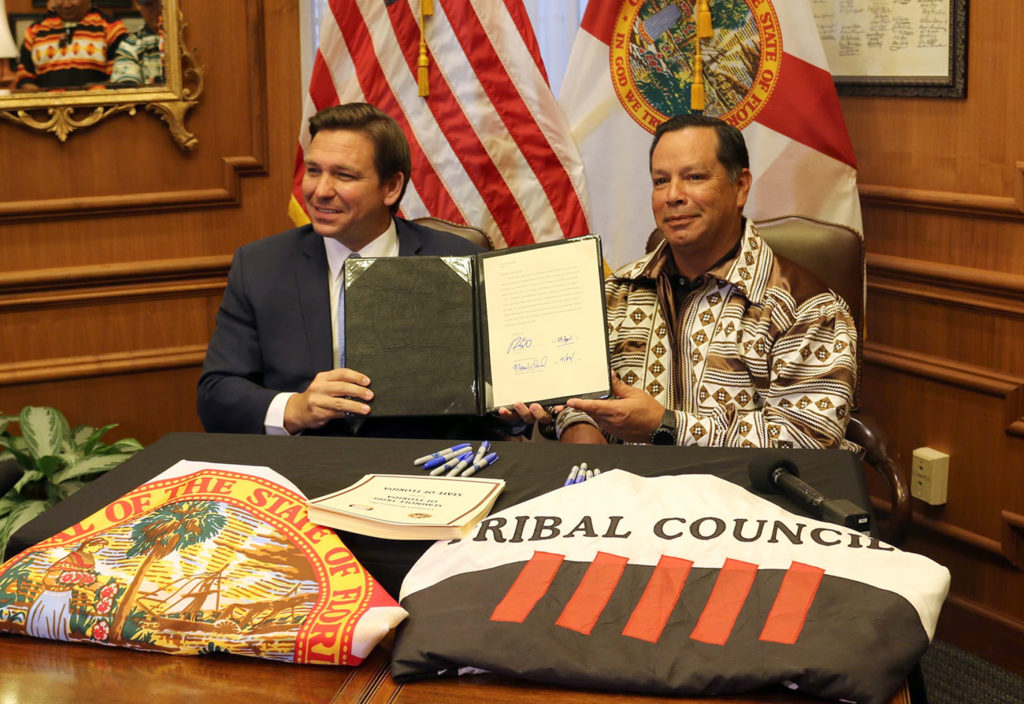
In what would be the largest expansion of gaming in the state in over a decade, the Florida legislature will debate changes to their laws on gaming in the state. Governor Ron DeSantis signed a new compact with Chairman Marcellus Osceola, Jr., and the Seminole Indians of Florida at the end of April, forcing the calling of a special session of the legislature to ratify the document. If it is approved, it would not only radically change the gaming offerings in the Sunshine State but would also have a long-lasting impact on overall gaming in the state.
Long-Term Plan for Lots of Money
The compact signed by DeSantis and Osceola runs for an unheard of 30-year time span. The previous compact between the parties lasted for 15 years and it was even considered too lengthy, considering the ever-changing world of casino gaming. The deal locks in that the Seminoles would pay the state of Florida a minimum of $500 million per year, with the payments increasing should the revenues increase.
“The agreement we are about to sign is going to be life changing for our tribe,” Osceola said during the announcement, and the same could be said for others not necessarily involved with the tribe. The Seminole casinos employ roughly 20,000 people in the state, a wide-ranging impact that is felt in communities like Hollywood, Tampa, and Immokalee. DeSantis, who admitted that there is a great deal of gaming that goes on in a gray area, firmly stated, “We just trust the Tribe to be the ones doing it rather than stuff that is offshore.”
There is no provision in the compact that would allow for online casino gaming or poker to be offered. There is a clause in the compact that allows both parties to reopen discussion in three years, however. It is thought that, should online poker and other casino gaming take off, that the Seminoles and the leadership in Tallahassee could take on that subject at that time.
Table Games, Sports Betting in the Mix
The new compact would resolve a few issues that have arisen between gaming factions in the state of Florida. It would also allow for some new games to be offered by both the Seminoles and by other gaming entities. But the biggest change might be the one that makes the compact run afoul of the law.
In signing the compact (and getting the money), the Florida government has given permission for the Seminoles to offer table games that they were not previously able to offer. This includes such casino gaming staples as craps, roulette and other gaming options. The Seminoles would also get rights to open three new casinos inside the state.
The biggest change to gaming in Florida would be the opening of sports betting in the state. Through this compact, the Seminoles would receive the rights to operate mobile sports betting. Through servers located on its property, the Seminoles would earn extensive revenues from this activity.
The pari-mutuel rooms at horse racing tracks and (former) dog tracks would also benefit from this part of the compact (greyhound racing was discontinued in Florida at the end of 2020). These organizations would be able to also offer sports betting, but they would route all their traffic through the Seminole servers.
Amendment 3 May Squelch the Compact
Even if the legislature approves the compact, there are several steps left to go.
There is a potential challenge from opponents of the compact who state this is actually violating the Florida Constitution. In 2018 voters passed Amendment 3, which designated that any changes to gaming in the state would have to be approved by a 60% vote of the citizenry. The introduction of mobile sports betting would be a massive change that would seem to have to fall into this category, although DeSantis and Osceola believe that the Seminoles’ sovereignty overrules the state’s Constitution. Still, there are forces that are mobilizing that would look to challenge the compact under the Amendment 3 regulations in a courtroom.
Another step that might arise is with the federal government. The Department of the Interior oversees tribal gaming in the U. S. and they would have to sign off on the compact before it could take effect. Any decision on that would be made later this year, during the summer at the earliest.
The compact still has to get through the Florida legislature, however. Preliminary indicators are that the deal is too big and legislators are not going to want to stand in front of a historic compact. Until the votes are counted, though, approval cannot be a certainty.























